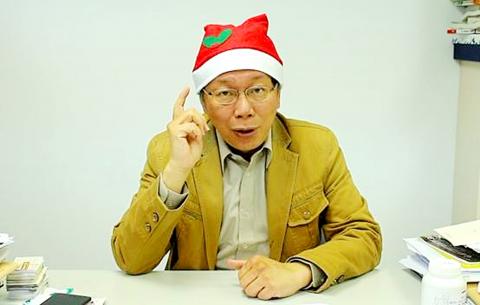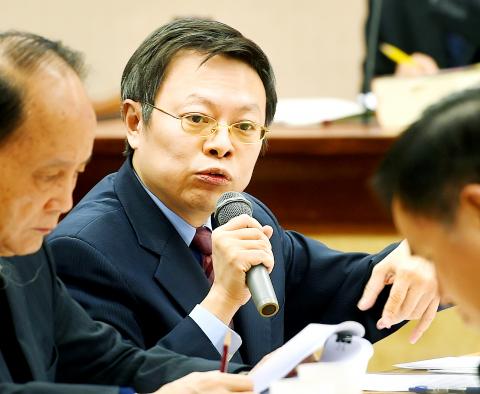Mainland Affairs Council (MAC) Minister Wang Yu-chi (王郁琦) yesterday lashed out at Taipei mayor-elect Ko Wen-je (柯文哲) for saying that the “1992 consensus” is outdated and that new ideas are needed to conduct cross-strait exchanges.
Ko made the remarks during an interview published on Tuesday by the Central News Agency in which he proposed replacing the “1992 consensus” with the “four mutuals” — mutual knowledge, mutual understanding, mutual respect and mutual cooperation.
Wang responded that the “1992 consensus” is an essential and practical part of cross-strait exchanges, adding that Ko should learn more about the matter before commenting on it.

Photo: Chen Ping-hung, Taipei Times
“As a mayor[-elect] of a local government, Ko does not have to make remarks on cross-strait exchanges, but if he really wishes to comment on this, he should first take an in-depth look into the backdrop against which the ‘1992 consensus’ was created and at its effect on cross-strait exchanges today,” Wang said.
The “consensus” refers to an alleged tacit agreement reached in 1992 that both Taiwan and China belong to one China, with each side having their own interpretation of what “one China” means.
Although the Chinese Nationalist Party (KMT) government claimed that the consensus was agreed upon during the first cross-strait conference in Singapore in 1992, former MAC minister Su Chi (蘇起), who was involved in the 1992 meeting, later said he made up the term.

Photo: Fang Pin-chao, Taipei Times
Wang yesterday said that the “1992 consensus” is certainly “ambiguous,” but it is that ambiguity which gives Taiwan and China a buffer zone when dealing with politically sensitive issues.
“I would say that it is because of the ‘1992 consensus’ that cross-strait relations have been able to progress so much since President Ma Ying-jeou (馬英九) took office in 2008. We can see how bad things got during the Democratic Progressive Party administration, when the government refused to recognize the ‘consensus,’” Wang said.
Responding to Wang’s remarks, Ko said the “1992 consensus” has been around for 22 years and yet cross-strait relations are still unclear.
“We need some new ideas in dealing with cross-strait relations,” he said.
However, Ko added that, as a mayor, he has no authority to deal with cross-strait issues, but had been “merely making the remarks [in the interview] as a citizen of the nation, so if Wang thinks he is better at that, he can deal with cross-strait exchanges however he wants.”

Auckland rang in 2026 with a downtown fireworks display launched from New Zealand’s tallest structure, Sky Tower, making it the first major city to greet the new year at a celebration dampened by rain, while crowds in Taipei braved the elements to watch Taipei 101’s display. South Pacific countries are the first to bid farewell to 2025. Clocks struck midnight in Auckland, with a population of 1.7 million, 18 hours before the famous ball was to drop in New York’s Times Square. The five-minute display involved 3,500 fireworks launched from the 240m Sky Tower. Smaller community events were canceled across New Zealand’s

The Ministry of Foreign Affairs (MOFA) yesterday said it is closely monitoring developments in Venezuela, and would continue to cooperate with democratic allies and work together for regional and global security, stability, and prosperity. The remarks came after the US on Saturday launched a series of airstrikes in Venezuela and kidnapped Venezuelan President Nicolas Maduro, who was later flown to New York along with his wife. The pair face US charges related to drug trafficking and alleged cooperation with gangs designated as terrorist organizations. Maduro has denied the allegations. The ministry said that it is closely monitoring the political and economic situation

‘SLICING METHOD’: In the event of a blockade, the China Coast Guard would intercept Taiwanese ships while its navy would seek to deter foreign intervention China’s military drills around Taiwan this week signaled potential strategies to cut the nation off from energy supplies and foreign military assistance, a US think tank report said. The Chinese People’s Liberation Army (PLA) conducted what it called “Justice Mission 2025” exercises from Monday to Tuesday in five maritime zones and airspace around Taiwan, calling them a warning to “Taiwanese independence” forces. In a report released on Wednesday, the Institute for the Study of War said the exercises effectively simulated blocking shipping routes to major port cities, including Kaohsiung, Keelung and Hualien. Taiwan would be highly vulnerable under such a blockade, because it

UNRELENTING: China attempted cyberattacks on Taiwan’s critical infrastructure 2.63 million times per day last year, up from 1.23 million in 2023, the NSB said China’s cyberarmy has long engaged in cyberattacks against Taiwan’s critical infrastructure, employing diverse and evolving tactics, the National Security Bureau (NSB) said yesterday, adding that cyberattacks on critical energy infrastructure last year increased 10-fold compared with the previous year. The NSB yesterday released a report titled Analysis on China’s Cyber Threats to Taiwan’s Critical Infrastructure in 2025, outlining the number of cyberattacks, major tactics and hacker groups. Taiwan’s national intelligence community identified a large number of cybersecurity incidents last year, the bureau said in a statement. China’s cyberarmy last year launched an average of 2.63 million intrusion attempts per day targeting Taiwan’s critical